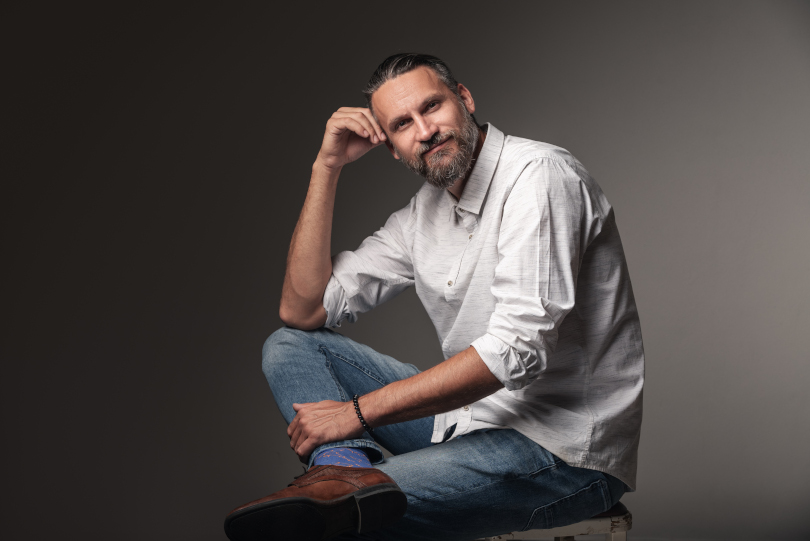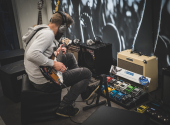
Filip Černý: Don’t Forget About Things That You Enjoy
Is the position of a marketing director in a company that is the largest seller of musical instruments in the Czech Republic a dream job? At first glance, it might seem so. Kytary.cz operates in twelve European markets, and their Razzor Cases brand is also successful. In addition, the company uses beehives music-wise, produces its shows, is an active publisher and manages to organize its own Festiwall. But the reality is more complicated. "Sometimes everyone is in a bad mood, resigned or demotivated. But I have seen a very thin line between anxiety and diagnosis in many people," says Filip Černý, who prevents borderline states in his company and his personal life by being able to do things he enjoys.
When we last spoke three years ago, Kytary.cz was growing fast, you had a lot of plans, and big stars were about to perform at Festiwall. Today you need to be much more modest. What’s the most important thing that’s changed about your work and your personal life during that time?
Everything has changed: my worldview, planning and management. In 2019, I had a much greater sense that I could manage, control and move things in the direction I set myself. But gradually, I had to accept that some things go their own way and evolve themselves. This is true at work and in personal life. My kids are in their teens, so it’s getting out of my control there, too.
Has the covid and the war in Ukraine changed your corporate culture and values, in addition to your organisational functioning?
I think we have shifted a lot in our values as a company in the last period. With our frenzied growth of the last few years, we’ve focused well on the business but less on the values. Now the entire management team is paying much more attention to them, and I’m very happy about that. We were able to pause a bit before the covid, and we are already fulfilling our own mission in this area.
Is it also related to your mission that you stood unequivocally for Ukraine at the beginning of the war, even though it may have polarised some customers?
This attitude is certainly related to values. On the very first day of the war, we broke off our cooperation with Russian companies and withdrew Russian products, and then sent hundreds of thousands of crowns to People in Need. We contacted our Ukrainian collaborators to see if there was anything we could do to help. I think that not only the management but also most people in our entire company shared that attitude. We are convinced that we did the right thing, even though some customers wrote us very nasty things.
One of the company’s owners, Vláďa Myslík, wrote that covid brought you very close as a team. You were able to come together, work in new conditions and overcome problems with deliveries. What is the atmosphere in Kytary.cz like these days? And how is the war affecting the musical instrument market?
The supply situation is still the same, unfortunately. Manufacturers are still not back to the shape they were in before the crisis, they are delivering late and supplies are low. However, we have got used to this, we have set up new mechanisms and order goods more ahead. The unpleasant thing for us is that we are in a period of what economists call stagflation when people are simply much more cautious. There is inflation, an energy crisis, and it’s one crisis after another. We were not ready for this at all, but we took measures quickly enough to stabilise this period. The mood in the company is therefore still good.

Is introducing an admission fee at the Festiwall, which used to be free, a consequence of the worse condition of suppliers?
The main reason is our belief that Festiwall has its value. When something is for free, people hold it cheap. But it’s true that our suppliers are not as involved in the program as they used to be. We book most of the bands ourselves and pay them out of our budget.
So the primary criterion when making the lineup is no longer whether the musicians are company players?
The ratio has reversed. In the past about 70% of the programme used to depend on how we agreed with the producers and who they would send here, today it is us to decide on 60% of the programme. Unfortunately, the crisis has also changed the fact that we won’t be getting anybody across the ocean this year. Last time there were great players from the United States and Australia, and now it’s not possible. Some musicians are still afraid to travel.
One of the initiators of the Festiwall was originally Roland, who provided their Roland Boss Truck for the event. Did they motivate other big players to get more involved?
It’s very much about people, and nowadays, companies are generally less willing to go for an event like this. Large corporates, in particular, got stuck in a post-covid mode and don’t want to participate in events where more people congregate—or are simply cutting budgets. But still, many big players are getting into it with us, including D’Addario, Fender, Yamaha, Ibanez, Meinl, Nord, Zildjian, Hughes & Kettner and many others.
In the programme, you return to the legendary guitarist Radium Hladík. Will it be something special?
When Kytary.cz celebrated its fifteenth anniversary at the Archa Theatre in 2015, we managed to bring together five generations of musicians. Radim Hladík was the oldest, Rony Janeček the youngest. At that time, Michal Pavlíček, who knew Radim’s health condition, told me in the dressing room how much he enjoyed playing there and that he appreciated it very much because something like that would probably never happen again.
We have very nice relationships with Zlata Hladíková and the Blue Effect band people, and their music requires a specific audience. So it was actually quite natural that we found each other again—and the unique project New Synthesis will be performed at the Festiwall after being postponed twice.
What else from the Festiwall programme would you like to invite us to?
Definitely to Swedish Dirty Loops. On the one hand, it’s about musical equilibristics, but at the same time, they have catchy pop melodies. It’s a kind of disco for adults, which I really enjoy. I’m also looking forward to Haydamaky, a Ukrainian band using folk elements. I saw them in Prague years ago, and they were great. I also recommend Kumšt Live. The guys recently played at our company party, and they really nailed it. And worth mentioning is the accompanying program, workshops and panel discussions for different levels of musicians.
There will be the most exhibitors historically in the trade show section. Is there any icing on the cake in this area as well?
For example, the exhibition of guitars by Jolana, a legend of Czech guitar making, will be great. And in addition to several big players, there will also be a lot of small Czech manufacturers who make very nice custom instruments.
You engage a lot in educating musicians. What are you working on right now?
On our YouTube channel, there are a lot of courses not only for guitarists and drummers but also piano or flute playing schools. We’re trying to help especially beginners because there are still not enough materials for them. And we also publish a lot of publications, especially instrument practice books. The latest of them, Rhythms & Breaks for Drum Kits, will be launched by its author Martin Vajgl right at the Festiwall.
However, with covid, we have moved many of these projects online and haven’t fully jumped back in yet. We definitely plan to revive it, meet more, and do more workshops, clinics and talks. I’m looking forward to Festiwall for that reason, too.
Has your customers’ buying behaviour changed in any way recently? Are more expensive or cheaper instruments in demand?
Expensive things sell best in a crisis. People who have enough money take it as an investment. In a period of inflation, it’s just better to buy a custom instrument for a hundred and fifty thousand than to keep the money in the bank. Plus, the instrument plays great, and you can sell it at a higher price in five years.
How is your Razzor Cases brand doing?
It’s doing great – and I’m very happy about that. Razzor Cases, designed by our technical director Tomáš Novák, will have their own booth at the Festiwall. The brand is doing well not only in our country, where we are the market leader, but there is also huge interest abroad.
And we want to follow this path of a “higher added value” more in the future. During the crisis, we started to enjoy making our own products – partly also due to the rising transport prices and the dependence on China. I have a lot of ideas in my head already...
At the same time, you admitted that Kytary.cz has to be more conservative now, which is why you’re not even planning to expand to other countries yet. Are twelve countries enough?
Generally, we have operated in step changes so far because, for example, we opened even three countries at the same time. Now we are in a period of fine-tuning and stabilising the situation. We are trying to improve what we have and are not embarking on any major experiments. There is always room for improvement.
Even in marketing ideas – for example, how about completing the delivery of light instruments by drone?
The drone thing was such a crazy idea. We gave it a try, but I don’t expect it to be a standard mode of transportation in the next ten years. We want to pursue other ideas. We have a beehive that we also use for playing, and we’ll definitely come up with other projects.
But at the same time, I admit that I’ve switched into a kind of economic mode a lot lately – to provide for all 200 of our employees and be in the black. Hopefully, I’ll get to some of the creative stuff soon, so that I can inspire our various teams more, in addition to creating a stable background.
After three years of crisis management and fifteen years in the company, do you feel you inspire your colleagues less than you would like?
Everyone has times when they are excited, but also moments when not every job goes as well as they would like. Or when they meet people who are not on the same page, and it’s hard to work with them. I’ve gotten feedback from a lot of people from outside about how great it is to do marketing at Kytary.cz. But they often only see the gilt.
I still really enjoy it, of course, but at the same time, I’ve only been doing crisis management for the last two or three years, which is not good for your mental condition at all. So I’m trying to balance it out and do things with my colleagues that we enjoy. That’s why we would play our beehives or fly a drone from time to time. Or we organise the Festiwall, even though it means so much work. It’s just important not to forget about things that don’t keep us afloat economically but bring joy.
Are your own musical activities still a source of joy?
Definitely. And also because, unlike last summer, when I was on stage every weekend, I play quite little now. Back then, it was too much for me, I was angry with myself. I love music and playing, but I also like to go to the woods or the mountains. Music is still my leisure activity that doesn’t make my living. I don’t have to act at every town festival.
That sounds like a mature attitude. Many people try to do things to the fullest and without any boundaries at all times—and don’t pay any attention to what’s happening to their psyche. That’s why we at Frontman.cz want to hold a panel discussion at Festiwall to focus on the mental health of musicians and how they cope with trauma through their work.
Mental health is still quite underestimated. Sometimes everyone is in a bad mood, resigned or demotivated. But I have seen a very thin line between anxiety and diagnosis in many people. They’re teetering on the edge of the precipice without knowing it. Some people stay on edge for a long time, others fall very early.
As far as music is concerned, I’m lucky that I don’t do it for a living. When I’ve had a hard day, I play the guitar at home, which helps me a lot. It’s a different situation than when I have to get ready for a gig and learn something quickly—it feels more like work. Here I just turn on the guitar and turn my head off. I start improvising or looping a groove and playing something to it. That’s how I like to practice. And I should do it even more...
If you have found an error or typo in the article, please let us know by e-mail info@insounder.org.




